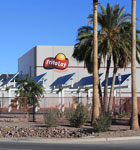 Backgrounder/
Backgrounder/
Frito-Lay specifically chose the Casa Grande facility for its largest environmental project to date because of the state’s endless supply of free renewable solar energy. “Casa Grande has one of the best solar concentrations in the [United States], and we’d be crazy not to take advantage of it,” Haft says. The Casa Grande facility was also the ideal location for the company’s other imperatives: water conservation, recycling, and a return on the investment.
Challenge/
Frito-Lay wanted to create one of the first near-zero-waste facilities of its kind and achieve LEED-EB Gold certification. Yet it needed to maintain profitability.
Solution/
First, Frito-Lay took advantage of the desert sunlight through a wide array of solar technology, including a 36-acre solar field installed with the help of Gloria Solar, Arizona Public Service, and SPP. This installation alone produces 10 million kilowatt-hours annually and helps produce the electricity needed to run the manufacturing plant.

A portion of Frito-Lay’s Casa Grande plant’s solar array. Not shown is the 36-acre solar field nearby.
Second on the list was water. Conserving water is incredibly important to the state of Arizona, and using membrane bioreactor processes (MBR) with secondary filtration enabled Frito-Lay to reuse the water used in the chip-making process. “The facility was using 400,000 gallons of water a day, and that has been reduced by 65 percent,” Haft said. New technology enhancements will increase water recycling to 75 percent. “This process takes the processed water that has been used to wash corn and potatoes and turns it into water that meets established drinking standards. The recycled water is equal to or [of] better quality than most tap water.”

A water-recovery and -reuse system that combines membrane bioreactor and low-pressure reverse-osmosis technologies.
Frito-Lay wanted to make the most of the green technologies available, but in order to meet what Haft and his team refer to as their BHAGs (Big, Hairy, Audacious Goals), it was going to require more than cutting-edge technology. Employees at the facility would need to work smart and work hard, which is why one of the most comprehensive recycling programs imaginable was put in place—and with great success. More than 99 percent of Casa Grande’s waste is diverted from landfills. Besides the all-important employee-led recycling program, the facility also reuses shipping boxes several times, and waste product from the manufacturing process is used in animal feed.
Though it’s good to be green, when running a publicly traded company, sustainable efforts need to translate into profits for shareholders. Thankfully, they have. Frito-Lay’s company-wide endeavors have saved the business millions of dollars. “Environmental sustainability is important, but there’s more behind it than that,” Haft said. “We look at every angle. We look at all of the elements of our manufacturing, distribution, and transportation systems and try to make them come together in a way that creates as small an environmental footprint as possible, while also driving business success. That’s what Frito-Lay’s parent company PepsiCo means when it says, ‘Performance with Purpose.’” The performance was enough for the USGBC as well. In 2009, the facility became the nation’s first food-manufacturing site to be awarded LEED-EB Gold certification.

